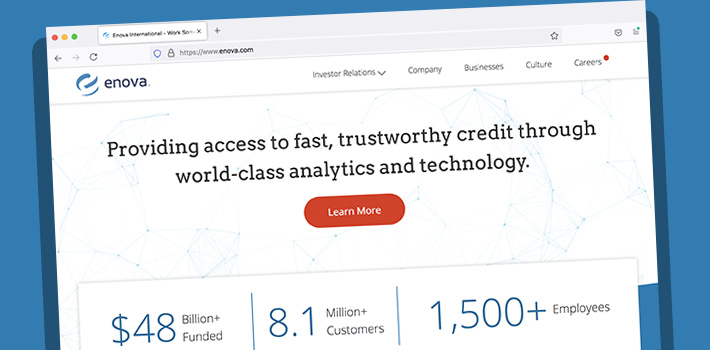Articles by deBanked Staff
Should Lightspeed Ramp Up its Merchant Cash Advance Business?
August 18, 2023 Analysts are wondering if Lightspeed should be doing even more merchant cash advances than the company’s currently doing. The company generated just $8.1M in revenue from them over the last fiscal year, a number that amounted to just 1% of total revenue.
Analysts are wondering if Lightspeed should be doing even more merchant cash advances than the company’s currently doing. The company generated just $8.1M in revenue from them over the last fiscal year, a number that amounted to just 1% of total revenue.
“Under normal circumstances, we would likely be pushing [Lightspeed] Capital even harder,” said Lightspeed CFO Asha Bakshani during the Q1 2024 FY earnings call this month, “however, given the current macro environment, we’re being conservative on the ramp. There’s no lack of demand from our customers, and we believe our high GTV customer base is an ideal demographic to use this financial service, especially in the long term. Risk of business failure is much lower with high GTV customers, but the need for capital is still substantial.”
When Lightspeed touted that it had increased its total merchant cash advance receivable balance by $11M for the quarter, an analyst from Bank of America Merrill Lynch wondered if they were being too conservative. “You mentioned that you would be pushing harder, but given the macro, you’re being conservative on the ramp,” the analyst said, “But then, you also mentioned that there is demand for it, so if there is demand, why not push a little bit harder for capital?”
“Yeah, you’re absolutely right,” Bakshani replied. “Capital is a very promising business for us, but what we have to keep in mind is that it still represents today a low single-digit millions in terms of revenue. And so when our sales teams are fully focused on unified payments, there was some distraction in the quarter on capital. And in addition, we want to make sure that in today’s macro that we’re not rushing anything. We want to make sure that we ensure that we stick with the very high rated credit-rated customers for eligibility. But you’re absolutely right, there’s tons of demand. We’re just taking our time intentionally given the macro. Our default rates still remain extremely low, but we definitely should see that pick back up in the back half of the year when unified payments is behind us.”
Lightspeed’s merchant cash advance program was repeatedly raised during the call in very positive terms.
“Once you’re on Lightspeed payments, we underwrite you for capital so you can have access to capital,” said Jean Paul Chauvet, CEO of Lightspeed. “That is a big win for them and our customers.”
Small Business Funding Companies Showcase Phenomenal Growth
August 15, 2023The annual Inc 5000 list is out again and with it some big reveals about who in the industry is taking off like a rocket. We’ve pulled out some of the relevant names for you below!
#30 – B2 Capital Solution Provider – Miami, FL – 10,446% growth over 3 years
#38 – Novo – Miami, FL – 9,906%
#76 – Byzfunder – New York, NY – 6,228%
#89 – Valiant Capital – Houston, TX – 5,223%
#157 – Ampla – New York, NY – 3,404%
#180 – LeasePoint Funding Group – Austin, TX – 2920%
#192 – Backd – Austin, TX – 2,819%
#269 – Percent – New York, NY – 2,087%
#1383 – eCapital – Aventura, FL – 422%
#1617 – North Mill Equipment Finance – Norwalk, CT- 354%
#1622 – Oakmont Capital Services – Westchester, PA – 346%
#1837 – Nav Technologies – Draper, UT – 305%
#1942 – Crestmont Capital – Irvine, CA – 289%
#2026 – 7 Figures Funding – American Fork, UT – 277%
#2593 – SBG Funding – New York, NY – 210%
#2929 – 1West – New York, NY – 179%
#2947 – ApplePie Capital – San Francisco, CA – 178%
#3145 – Channel – Minnetonka, MN – 164%
#3737 – Direct Funding Now, Irvine, CA – 128%
#4085 – Smarter Equipment Finance – Las Vegas, NV – 111%
#4094 – iAdvance Now. – Uniondale, NY – 111%
#4651 – Expansion Capital Group – Sioux Falls, SD – 87%
If we missed you, let us know, email info@debanked.com.
Loan Applicants Might Just Give Up After Unattractive Offer
August 13, 2023 A lender offering unattractive loan terms may not be driving those prospects into the arms of a competitor. Instead, they might actually be discouraging them from searching any further.
A lender offering unattractive loan terms may not be driving those prospects into the arms of a competitor. Instead, they might actually be discouraging them from searching any further.
This phenomenon was raised in Upstart’s most recently quarterly earnings call when analysts began asking about APRs and acceptance rates. Upstart’s max APR is 36% and they’ve found that the higher the rate goes, the less likely the applicant will accept it.
“I mean it’s very simple,” said Upstart CFO Sanjay Datta. “It’s a pretty classic sort of supply and demand construct, where we raise our rates and not only do our approval rates go down because of the 36% APR cut off but for those who remain approved they’ll be less likely to take a loan.”
That is when Datta expanded further on what becomes of applicants who choose not to move forward.
“And typically, at least what we’ve observed in our data is that people who don’t take loans with us don’t necessarily take them from a competing source,” Datta said. “The majority of them just don’t take the loan. So it causes people’s demand to reduce.”
The Q&A did not invite further opportunity for additional insight on why that might be. Upstart’s experience as a consumer lender also may not translate into small business lending either. For example, in April 2022, a fintech lending study found that 40% of business loan seekers compared more than six options.
Bank Issues Humorous Quarterly Earnings Statement
August 10, 2023 Think all banks are boring? First Guaranty Bank which operates primarily in Lousiana and Texas, opened its most recent quarterly earnings with a letter from its president Alton B. Lewis.
Think all banks are boring? First Guaranty Bank which operates primarily in Lousiana and Texas, opened its most recent quarterly earnings with a letter from its president Alton B. Lewis.
“Resilient: Springing back, rebounding,” Lewis begins in his address to shareholders, citing Random House Webster’s Unabridged Dictionary Second Edition. “Returning to the original form for position after being bent, compressed or stretched. Recovering readily from illness, depression, adversity, or the like; buoyant. Another good word is strong. An even better word is tough. These are words that describe what First Guaranty has been during a six month period in which we have survived wound after wound, not of our own causing as we continue to deliver to our shareholders, customers, and our staff members extraordinary results.”
It then goes on to say that there’s been “enough crying over spilt milk” and that “basically, we have and will continue to make a lot of money for our shareholders.”
Lewis appears to have at least delivered. “We have significantly increased our loan interest income to offset the increased cost of deposits which are set by the Federal Reserve,” he said. “For the quarter, we made over $2,000,000 for our shareholders even after the FDIC assessment.”
Square Loans Adds Monthly Payment Option, Tops $1B in Loans in Q2
August 4, 2023Block’s Square Loan subsidiary is adding another business loan feature to its arsenal, a monthly payment option “to serve larger sellers who wanted more visibility into managing their cash flow.”
The company had a major quarter by making 119,000 loans for a total of $1.10 billion in originations. The company has consistently ranked among the top online small business lenders in the country.
Square Loans said that 25% of its fixed payment loan customers so far have been “mid-market sellers,” small businesses that process more than $500,000 in annual card payment volume.
Shopify Capital Continues to Gain Momentum
August 2, 2023Shopify Capital continues to gain momentum, according to the company’s most recent quarterly earnings call. Historically, the company has broadcast its precise business loan and merchant cash advance origination figures for each quarter but this time it held off from doing that. Instead, it emphasized that it had “$719 million in loans receivables and merchant cash advances outstanding on June 30, 2023.” As that figure came straight off the balance sheet, that could be compared to the $629M outstanding in the quarter before. So, receivables went up but originations was not disclosed.
Nevertheless, Shopify explained that Capital was among several business segments that were leading to some of highest cross-sell volumes they have ever achieved.
“The team is working tirelessly,” said Shopify President Harley Finkelstein. “They’re executing it really effectively.”
Former MBE Capital Partners, LLC CEO Sentenced to 4.5 Years in Prison
July 31, 2023 Rafael Martinez, the former CEO of MBE Capital Partners, LLC, is going to prison. The company was a PPP lender during covid but it was alleged it should not have been!
Rafael Martinez, the former CEO of MBE Capital Partners, LLC, is going to prison. The company was a PPP lender during covid but it was alleged it should not have been!
In March 2022, the DOJ said that “Martinez used false representations and documents to fraudulently obtain the approval of the SBA for his company, MBE Capital Partners, LLC, to be a non-bank lender through the PPP. Martinez then used that approval to obtain approximately $932 million in capital to issue PPP loans and earn over approximately $71 million in lender fees.”
Martinez then spent those funds on himself, purchasing a villa in the Dominican Republic, a Ferrari, and private jets.
He pled guilty to conspiracy to commit wire fraud exactly a year later. Last week he was sentenced to four and a half years in prison.
Enova Originated $712M in Small Business Loans in Q2
July 27, 2023 Enova originated $712M in small business loans in Q2, according to the latest earnings report, up slightly YoY and down slightly QoQ.
Enova originated $712M in small business loans in Q2, according to the latest earnings report, up slightly YoY and down slightly QoQ.
Overall, the company says it has been taking a cautious approach even as it continues to grow. There is plenty of demand while the competitive environment remains fairly weak in their opinion.
“During the quarter, we closed our first ever facility secured exclusively by small business lines of credit,” Enova CEO Steve Cunningham said. “The two-year $287 million secured warehouse was priced at SOFR plus 420 basis points. Additionally, last week, we reentered the term securitization market with our first OnDeck deal since 2021. The rated three-year fixed rate $227 million term transaction priced with the blended coupon of 7.7%, demonstrating our confidence in the continued strength of our business relative to our current valuation.”






























